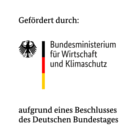IGF 22353 N

| Period: | 01.03.2022 - 30.08.2024 |
|---|---|
| Partner: | |
| Funder: | |
| Project manager: | |
| Team: |
The environmental contamination with persistent organic pollutants (POPs) emitted mainly by the pharmaceutical and chemical industry and agriculture is of ongoing concern for wastewater treatment. POPs consist of primarily halogenated chemicals like per- and polyfluoroalkyl substances (PFAS), pesticides and disinfectants, all highly resistant to photolytic, chemical and biological degradation. Therefore, removing POPs by conventional wastewater treatment plants is impossible, leading to the bioaccumulation of pollutants. Perfluorooctanoic acid (PFOA) has already been found in the human bloodstream and is linked to thyroid disease, endocrine disruption and cancer.
The project ECDeHalo aims the development of an electrochemical process for degradation of persistent organic pollutants in wastewater. In cooperation with the Aachener Verfahrenstechnik (AVT) their novel microtubular gas diffusion electrodes (GDEs), made from magnetite-doped carbon nanotubes (CNT), will be combined with boron doped diamond electrodes (BDD) in a modular flow cell. This setup allows the simultaneous generation of hydroxyl radicals on both electrodes and direct anodic oxidation of pollutants. Hydrogen peroxide is produced at the cathodes via the electrochemical reduction of oxygen and subsequently reacts to hydroxyl radicals due to a heterogeneous Fenton process initiated by the magnetite.
The electrochemical mineralisation of pollutants releases CO2, which is monitored using a nondispersive infrared (NDIR)-sensor. This novel gas monitoring system is used in conjunction with pH, conductivity and temperature sensor data to automatically control the electrolysis current density and achieve ideal current efficiencies and low energy consumption. This mini-plant setup would ideally treat industrial wastewater and nanofiltration, as well as reverse osmosis retentates on-site and on-demand.
back
Das IGF-Vorhaben Nr. IGF 22353 N der Forschungsvereinigung DECHEMA e.V., Theodor-Heuss-Allee 25, 60486 Frankfurt am Main wurde über AiF/DLR im Rahmen des Programms zur Förderung der industriellen Gemeinschaftsforschung (IGF) vom Bundesministerium für Wirtschaft und Klimaschutz aufgrund eines Beschlusses des Deutschen Bundestages gefördert.